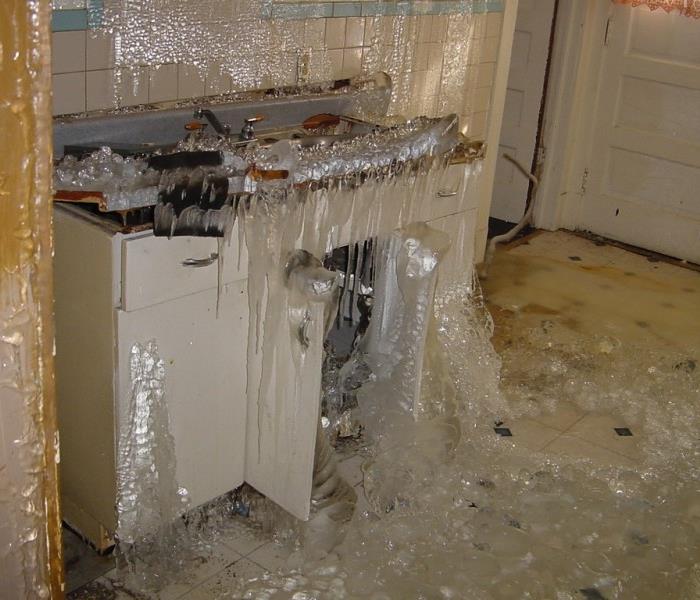How Can I Prepare for a Frozen Pipe Disaster
1/19/2016 (Permalink)
One of the most common things to happen to a home during a cold snap is water damage caused by frozen pipes, especially if your pipes aren't insulated. Even where extremely cold weather is normal in winter, pipes freeze and cause all kinds of problems. Pipes freeze when they're exposed to freezing weather for a few days. Problems come up when frozen pipes thaw; cold weather makes pipes brittle and frozen water has less volume than running water. The pipe breaks due to the cold, water starts running and then you've got a mess on your hands.
Pipes can freeze in 2 main areas – water coming in and water going out. You know water coming in is frozen because nothing comes out the tap. Frozen outgoing pipes from showers, toilets and sinks are a bigger problem because these will back up into the house; that's the reason it's always recommended to keep a little water dripping into the sinks and opening the cabinet doors under the sink ... running water doesn't freeze as easily as standing water.
Every winter season, the pipes in your Fernandina Beach / Jacksonville home are at risk of damage from freezing conditions. Low temperatures can cause your water pipes to freeze, and in some cases burst. The following tips can help you safeguard your home before, during and after a pipe freezes.
Prevent Your Pipe From Freezing
- Disconnect all gardening hoses and install covers on all outside faucets.
- Keep your house temperature at 68 degrees or higher, even if you're leaving the house for an extended period of time.
- Open cabinet doors below sinks to allow heat from the home to circulate.
- Identify the location of the main water valve and the valve on your water heater. (Learning the location of these valves may come in handy during an emergency.)
- Wrap pipes nearest exterior walls and in crawl spaces with pipe insulation or with heating tape. This can prevent freezing, especially for interior pipes that run along outside walls.
- Close all windows near water pipes; cover or close open-air vents. Freezing temperatures combined with wind drafts can cause pipes to freeze more frequently.
- Heat your basement and consider weather sealing your windows.
- Insulate outside walls and unheated areas of your home.
- If you plan to be away from home for an extended period of time, shut off water supply valves to your washing machine.
Monitor Freezing Pipe Conditions
- Allow a faucet to drip slightly (lukewarm water) in order to minimize freezing.
- The first sign of freezing is reduced water flow from a faucet.
- Check your faucets for water flow and pressure before you go to sleep and again when you wake up.
- Check pipes around your water meter, in unheated areas, near exterior walls and in crawl spaces.
- These tend to be vulnerable to freezing conditions.
- Identify cold air drafts coming in from a flue or chimney chase and caulk gaps that are near pipes.
If a Pipe Bursts
- Shut off water at the main valve.
- If the break is in a hot water pipe, the valve on top of the water heater should be closed.
- Call a professional restoration expert such as SERVPRO of Fernandina Beach/Yulee. Keep an emergency number nearby for quick access.






 24/7 Emergency Service
24/7 Emergency Service
